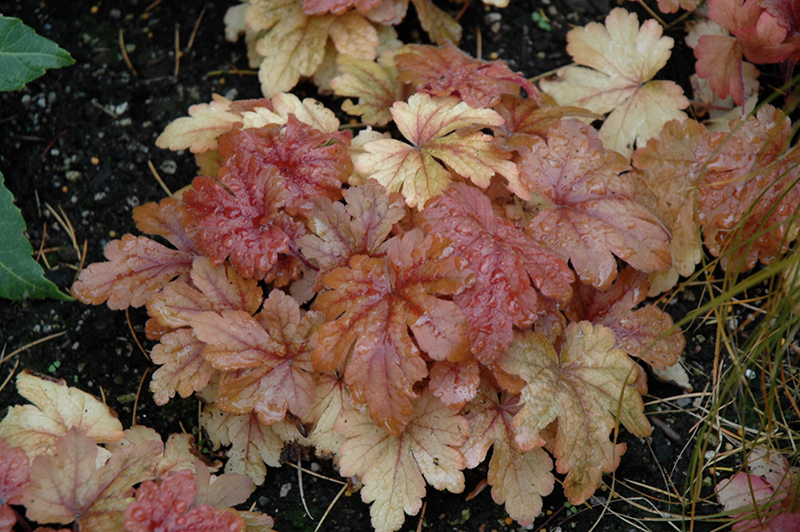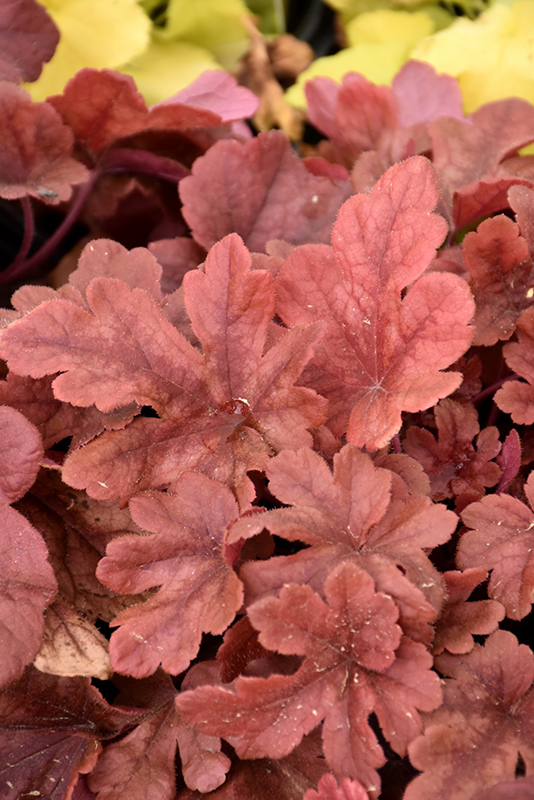Plant Finder
Buttered Rum Foamy Bells
Heucherella 'Buttered Rum'
Plant Height: 7 inches
Flower Height: 10 inches
Spacing: 12 inches
Sunlight:
![]()
![]()
Hardiness Zone: 4a
Description:
An exciting variety with golden yellow leaves that have rounded lobes with contrasting red streaks radiating from the leaf centers; dainty white bell flowers in late spring; a vigorous grower that forms a dense mound
Ornamental Features
Buttered Rum Foamy Bells features dainty spikes of white bell-shaped flowers rising above the foliage from late spring to early summer. The flowers are excellent for cutting. Its attractive glossy lobed leaves are gold in color with showy red variegation and tinges of buttery yellow. The foliage often turns rose in fall.
Landscape Attributes
Buttered Rum Foamy Bells is a dense herbaceous evergreen perennial with tall flower stalks held atop a low mound of foliage. Its medium texture blends into the garden, but can always be balanced by a couple of finer or coarser plants for an effective composition.
This is a relatively low maintenance plant, and should be cut back in late fall in preparation for winter. It is a good choice for attracting hummingbirds to your yard. It has no significant negative characteristics.
Buttered Rum Foamy Bells is recommended for the following landscape applications;
- Mass Planting
- Rock/Alpine Gardens
- Border Edging
- General Garden Use
- Groundcover
- Container Planting
Planting & Growing
Buttered Rum Foamy Bells will grow to be about 7 inches tall at maturity extending to 10 inches tall with the flowers, with a spread of 15 inches. When grown in masses or used as a bedding plant, individual plants should be spaced approximately 12 inches apart. Its foliage tends to remain low and dense right to the ground. It grows at a medium rate, and under ideal conditions can be expected to live for approximately 10 years. As an evegreen perennial, this plant will typically keep its form and foliage year-round.
This plant does best in partial shade to shade. It prefers to grow in average to moist conditions, and shouldn't be allowed to dry out. It is not particular as to soil type or pH. It is somewhat tolerant of urban pollution. Consider covering it with a thick layer of mulch in winter to protect it in exposed locations or colder microclimates. This particular variety is an interspecific hybrid. It can be propagated by division; however, as a cultivated variety, be aware that it may be subject to certain restrictions or prohibitions on propagation.
Buttered Rum Foamy Bells is a fine choice for the garden, but it is also a good selection for planting in outdoor pots and containers. It is often used as a 'filler' in the 'spiller-thriller-filler' container combination, providing a mass of flowers and foliage against which the larger thriller plants stand out. Note that when growing plants in outdoor containers and baskets, they may require more frequent waterings than they would in the yard or garden.
Disclaimer - This Plant Finder tool is an online resource representing many of the varieties that we carry over the course of the season, and is intended for informational purposes only. Inventory varies seasonally, so we cannot guarantee that every plant will be in stock at all times - please contact us directly for current availability. The Plant Finder tool does not include our entire selection of plants, so be sure to visit us to see varieties that may not be represented on this list.


